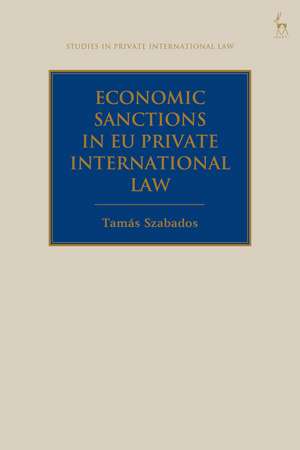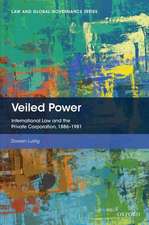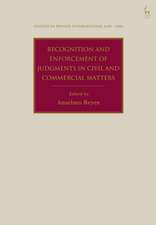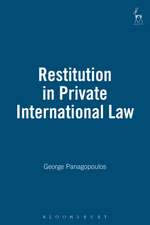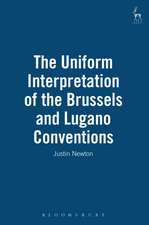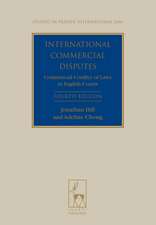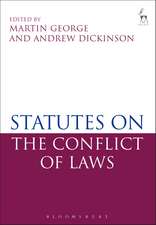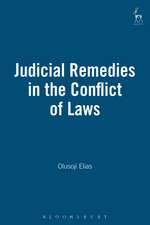Economic Sanctions in EU Private International Law: Studies in Private International Law
Autor Tamás Szabadosen Limba Engleză Paperback – 28 iul 2021
| Toate formatele și edițiile | Preț | Express |
|---|---|---|
| Paperback (1) | 312.40 lei 6-8 săpt. | |
| Bloomsbury Publishing – 28 iul 2021 | 312.40 lei 6-8 săpt. | |
| Hardback (1) | 569.94 lei 6-8 săpt. | |
| Bloomsbury Publishing – 22 ian 2020 | 569.94 lei 6-8 săpt. |
Din seria Studies in Private International Law
- 17%
 Preț: 303.92 lei
Preț: 303.92 lei - 18%
 Preț: 306.65 lei
Preț: 306.65 lei - 27%
 Preț: 379.56 lei
Preț: 379.56 lei - 22%
 Preț: 264.57 lei
Preț: 264.57 lei - 18%
 Preț: 356.99 lei
Preț: 356.99 lei - 17%
 Preț: 260.07 lei
Preț: 260.07 lei - 18%
 Preț: 322.05 lei
Preț: 322.05 lei - 30%
 Preț: 569.87 lei
Preț: 569.87 lei - 30%
 Preț: 776.59 lei
Preț: 776.59 lei - 11%
 Preț: 344.86 lei
Preț: 344.86 lei - 30%
 Preț: 792.16 lei
Preț: 792.16 lei - 30%
 Preț: 510.75 lei
Preț: 510.75 lei - 24%
 Preț: 183.61 lei
Preț: 183.61 lei - 40%
 Preț: 728.64 lei
Preț: 728.64 lei - 30%
 Preț: 567.99 lei
Preț: 567.99 lei - 30%
 Preț: 572.73 lei
Preț: 572.73 lei - 14%
 Preț: 725.13 lei
Preț: 725.13 lei - 22%
 Preț: 272.14 lei
Preț: 272.14 lei - 22%
 Preț: 201.34 lei
Preț: 201.34 lei - 30%
 Preț: 842.04 lei
Preț: 842.04 lei - 27%
 Preț: 381.09 lei
Preț: 381.09 lei - 17%
 Preț: 367.13 lei
Preț: 367.13 lei - 18%
 Preț: 359.54 lei
Preț: 359.54 lei - 30%
 Preț: 570.60 lei
Preț: 570.60 lei - 30%
 Preț: 578.19 lei
Preț: 578.19 lei - 30%
 Preț: 543.25 lei
Preț: 543.25 lei - 30%
 Preț: 1781.78 lei
Preț: 1781.78 lei - 18%
 Preț: 321.78 lei
Preț: 321.78 lei - 30%
 Preț: 572.06 lei
Preț: 572.06 lei - 30%
 Preț: 570.43 lei
Preț: 570.43 lei - 30%
 Preț: 536.97 lei
Preț: 536.97 lei - 30%
 Preț: 540.07 lei
Preț: 540.07 lei - 30%
 Preț: 721.14 lei
Preț: 721.14 lei - 22%
 Preț: 240.04 lei
Preț: 240.04 lei - 30%
 Preț: 511.64 lei
Preț: 511.64 lei - 30%
 Preț: 1201.00 lei
Preț: 1201.00 lei
Preț: 312.40 lei
Preț vechi: 382.35 lei
-18% Nou
Puncte Express: 469
Preț estimativ în valută:
59.78€ • 63.92$ • 49.84£
59.78€ • 63.92$ • 49.84£
Carte tipărită la comandă
Livrare economică 17 aprilie-01 mai
Preluare comenzi: 021 569.72.76
Specificații
ISBN-13: 9781509953578
ISBN-10: 1509953574
Pagini: 280
Dimensiuni: 156 x 234 mm
Greutate: 0.39 kg
Editura: Bloomsbury Publishing
Colecția Hart Publishing
Seria Studies in Private International Law
Locul publicării:London, United Kingdom
ISBN-10: 1509953574
Pagini: 280
Dimensiuni: 156 x 234 mm
Greutate: 0.39 kg
Editura: Bloomsbury Publishing
Colecția Hart Publishing
Seria Studies in Private International Law
Locul publicării:London, United Kingdom
Caracteristici
Rigorous study will appeal not just to lawyers but political scientists and international relations scholars
Notă biografică
Tamás Szabados is Associate Professor at ELTE Eötvös Loránd University, Budapest.
Cuprins
1. IntroductionI. Economic Sanctions in Private International Law II. The Aim of this Book III. Methodology and the Scope of the Work IV. The Object of the Analysis: Economic Sanctions V. Foreign Policy and Private International Law VI. Adjudicative Rhetoric and Foreign Policy Considerations 2. The Legal Framework for Imposing Economic Sanctions I. The UN Sanctions Regime II. Economic Sanctions in Bilateral and Multilateral Treaties III. Economic Sanctions in EU Law 3. Coherence and Legal Certainty in EU Law I. Coherence in the External Relations Law of the EU II. Legal Certainty and EU Law 4. Economic Sanctions in Private International Law I. Economic Sanctions: State Intervention in Private Law Relationships II. Economic Sanctions as Overriding Mandatory Provisions III. The Treatment of Foreign Public Law in Private Law Litigation IV. Conclusion 5. Economic Sanctions as Overriding Mandatory Provisions in EU Private International Law I. Economic Sanctions Imposed by the Law of the Forum State II. Economic Sanctions of the Lex Causae III. Economic Sanctions in the Law of a Third State Other than the Lex Causae IV. Conclusion 6. The Judicial Practice of the Member States I. France II. GermanyIII. England and Wales IV. Assessment of the Judicial Practice of the Member States V. The Outcome: A Changeable European Judicial Foreign Policy 7. Blocking Statutes I. Blocking Statutes and Private International Law II. A Conflict of Overriding Mandatory Provisions 8. 'Deactivation' of Economic Sanctions? I. EU Economic Sanctions and Choice-of-Court AgreementsII. EU Economic Sanctions and Arbitration Agreements 9. Possible Solutions and Conclusions I. Public Ordering of Contractual Relations Affected by Economic Sanctions II. Private Ordering of Contractual Relations Affected by Economic Sanctions III. The Role of Private International Law IV. Conclusions
